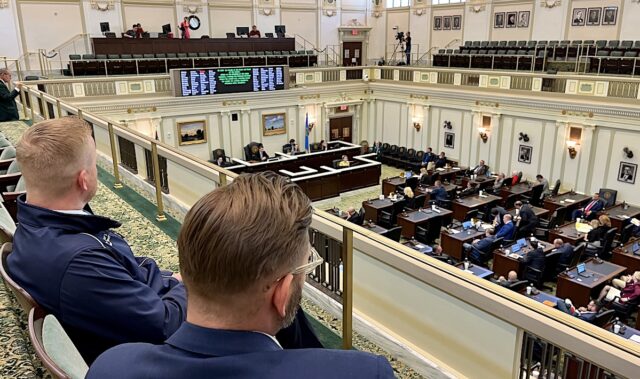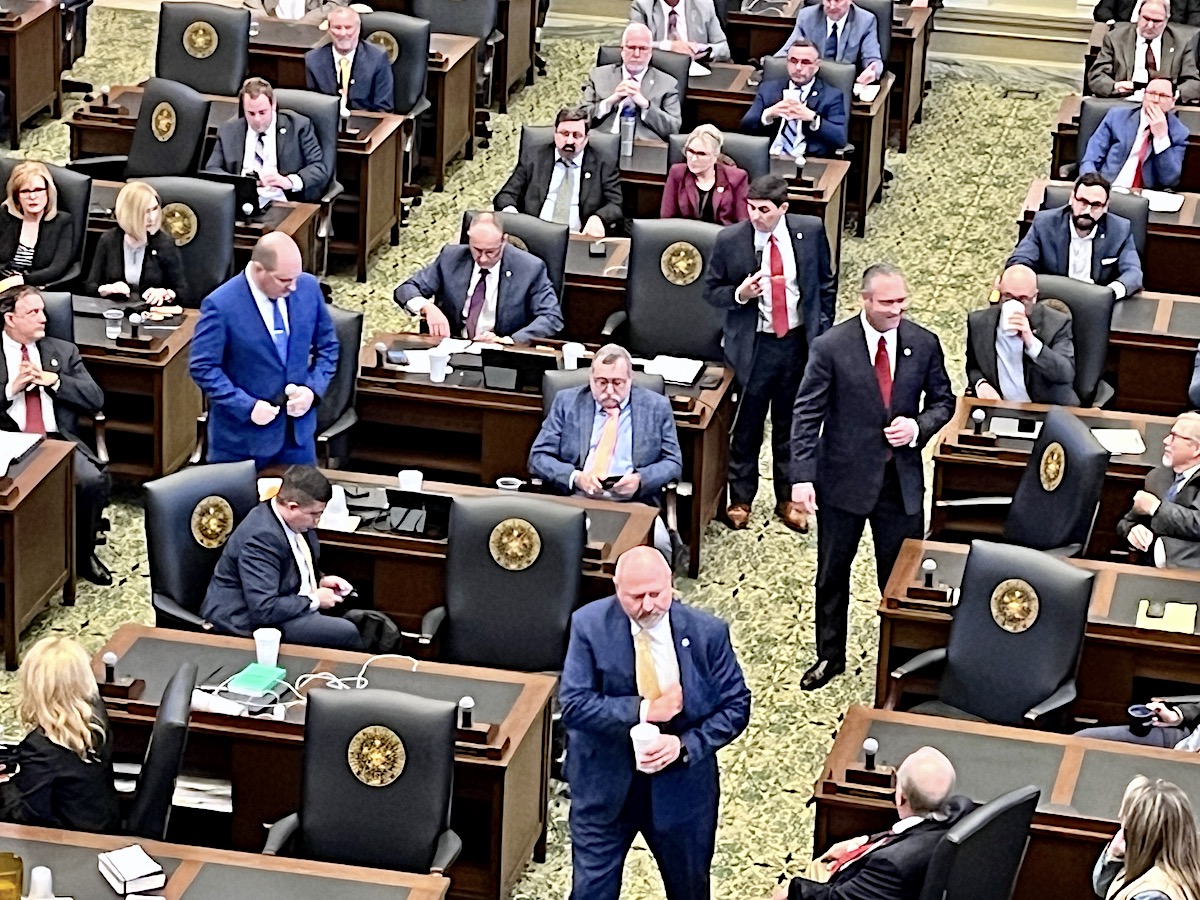

In their first chess move since the Oklahoma State Senate decoupled the Legislature’s education funding package from its proposed private school and homeschool tax credit program, the House of Representatives approved the school choice tax credit bill today but stopped short of sending it to Gov. Kevin Stitt in an effort to create leverage in negotiations over the funding measure.
House Republicans have insisted that rural Oklahoma must receive additional support “in exchange” for creating the new tax credits, which are expected to be used heavily in urban areas with more private school options.
“The House supports parental choice in education, and as I have said repeatedly over the past year, we are committed to making sure any education plan that is passed doesn’t hurt our public schools,” House Speaker Charles McCall (R-Atoka) said in a statement. “Today, the House passed the Senate’s tax credit plan, but I am holding the bill from going to the governor’s desk until we get agreement on a public education funding plan.”
As advanced by the Senate and passed 61-31 by the House today, HB 1934 would create a new, refundable tax credit program for families whose children attend private schools and who are homeschooled. The bill would create a $1,000-per-student credit for homeschool families and a tiered tax credit — between $7,500-per-student for families earning $75,000 or less and $5,000-per-student for families earning more than $250,000 — for private school families.
As originally proposed by the House, the refundable school choice tax credit bill had been tied legislatively to a proposal for more than $500 million of new appropriations for public school districts aimed at funding teacher pay raises and other school needs. But after a colossal kerfuffle between the chambers and the governor to conclude April, the Senate decoupled the proposals and sent new versions of each to the House in HB 1934 and a series of other bills.
Tuesday, the House advanced HB 1934, which would cap the school choice tax credit program at $150 million for Fiscal Year 2024. The cap would grow to $250 million over the subsequent two years.
But the House also rejected the Senate’s amendment to HB 2672, which proposed the Senate’s education funding package and teacher pay raise.
“It just throws rural Oklahoma smooth under the bus, and this House just isn’t willing to do that,” House Majority Floor Leader Jon Echols (R-OKC) said of HB 2672’s parameters.
Senate President Pro Tempore Greg Treat (R-OKC) released a statement criticizing the House’s decisions as “beyond disappointing.”
“The unprecedented move to hold the school choice legislation hostage until the Senate agrees to pass the constitutionally questionable Oklahoma Student Fund and other pet projects is also a non-starter for the Senate Republican caucus,” Treat said. “The plan we sent them treats every student the same no matter what their ZIP code is. Their plan with the Oklahoma Student Fund is to disproportionately give kids in certain areas (for instance, Atoka Public Schools) more money than all others. Their plan is a ridiculous and shameful notion that segregates children. The Senate is simply saying — treat every kid the same.”
Dems oppose House GOP move, Stitt celebrates
House Republicans caucused for more than an hour Monday and another several hours Tuesday to discuss various matters, including the education negotiations and a proposal for criminal justice sentencing reclassification.
At 4 p.m. Tuesday, the House returned to the floor and accepted the Senate’s amendment to HB 1934. (House members suspended internal rule 9.10 to grant McCall the authority to hold onto HB 1934 until a deal is struck with the Senate on education funding.)
House Democrats opposed the private school and homeschool tax credit bill, arguing that private schools do not meet the same requirements as public schools and that they disproportionately serve wealthier families.
“These monies are going to go primarily to the students that are already enrolled in the private schools, that are already engaged,” said Rep. Regina Goodwin (D-Tulsa). “This is a gift that has never ever been afforded to students in public schools. So that’s why it’s not equitable. (…) We know this is a gift for the rich.”
Rep. Andy Fugate (D-Del City) opened machinations on the measure by calling for a public vote on the refundable school choice tax credit proposal.
“If this body truly believes that the people of Oklahoma truly want vouchers, why don’t we let them decide?” suggested Fugate, who later noted it was National Teacher Appreciation Day.
House Republicans, however, pitched the proposal as a step forward for families seeking other options for students who are struggling in their local public school. Echols, who represents an urban area of southwest Oklahoma City, said House Republicans “are standing up for rural Oklahoma” by advancing HB 1934 but not sending it to Gov. Kevin Stitt until a final education funding agreement is struck. To do that, he implored the Senate GOP Caucus to “couple this thing with something for rural Oklahoma.”
“After today’s vote, there is one single, solitary issue left to negotiate in this building (on education), and there is one body saying, ‘Something has to be in this for rural Oklahoma,'” Echols said. “We are taking a step in good faith for the folks across the rotunda. If you want your version of the tax credit, you can have your version of the tax credit. (…) But you’ve got to couple it with something for rural Oklahoma.”
Gov. Kevin Stitt’s chief of staff and deputy chief of staff watched Tuesday’s House activities from the chamber’s gallery. After the vote on HB 1934, Stitt released a statement that implied the tax credits would soon become law, save for a final line that noted the House is still in possession of the bill.
“Today is a major victory for parents and students across the state,” Stitt said. “With the House’s action today, we have made transformative change to improve education outcomes for Oklahoma students. I am grateful to all members of the Legislature who have stood with parents and gotten school choice across the finish line.”

Baker on HB 2672: ‘There’s some unfunded mandates in there’
With HB 1934 advanced — but held from the governor’s desk — lawmakers’ education attention will turn to ongoing negotiations over the other half of the education apple cart: the proposal for pumping hundreds of millions of dollars in new money into (and potentially around part of) the state funding formula.
Although the Senate’s new proposal, unveiled Thursday, appeared to reignite chamber-to-chamber negotiations, leading House Republicans on the Common Education Committee said they have concerns about how money would reach rural districts and whether it proposes “unfunded mandates.”
“In their (the Senate’s) public school piece, there was a whole lot of parts in there that we can’t necessarily get behind. For me, the piece that I disliked was taking away the advanced, master and lead teachers — that was a bill that I worked on. Actually, our Senate counterparts were on board with that. Now, all of a sudden they want to take all that away and start a new program. That program has barely even had the opportunity to get started in the districts. So I don’t want to eliminate something that we worked so hard (on) and had so much support,” said House Common Education Chairwoman Rhonda Baker (R-Yukon). “There’s some unfunded mandates in there. When you start looking at the price tag for the stipends and the price tag for the pay raises, and then you add that up — but they’re only giving $500 million for the funding — there’s some problems with that. But we are really hoping that the negotiators will get to work and something good will come from it, and I think that it will eventually.”
Rep. Dick Lowe (R-Amber) offered similar concerns Monday after an initial review of the Senate’s education funding proposal.
“We’re still talking and trying to work out a plan that’s a benefit to everybody in Oklahoma, whether it’s urban, suburban or rural. Not sure we’ve got to that point yet — would love to get there soon — all of us would. But we’ve seen some things that are very disturbing no matter who you represent in what we’ve seen in there,” Lowe said. “In all versions. I don’t think anybody’s in love with any of them, but it’s what we call compromise here. And with that, I think we’ve still got some compromising to do.”
That compromise largely rests on whether the House will move off of its stated requirement that new education dollars include their proposed “Oklahoma Student Fund,” which would provide additional support for all school districts but cap that support for urban districts, functionally fracturing the per-pupil funding formula.
Senate leaders have insisted that the House’s capped “Student Fund” cannot pass their chamber. On Tuesday, Senate Appropriations and Budget Chairman Roger Thompson (R-Okemah) reiterated that the Senate does not like the House’s proposal.
“That is correct,” he said. “We do not.”
Still, Thompson said Tuesday that he and House Appropriations and Budget Chairman Kevin Wallace (R-Wellston) have resumed broader budget discussions in the wake of education negotiations moving forward slightly.
“What we have is we’re at the first of May, education discussions are still ongoing. I’ve got the Senate numbers plugged in, he’s got some House numbers plugged in,” Thompson said. “As we work through that process, we will tweak those numbers, but we are moving on forward with other elements of our state budget.”
Lowe, a former educator in southwest Oklahoma who serves on the House Common Education Committee, pushed back on the Senate’s assertion that creating a private school tax credit and breaking the funding formula with the House’s Oklahoma Student Fund would be “a double whammy” for urban and suburban school districts.
“It’s a double whammy when you send a pay raise for teachers mandate and don’t give any funding for a rural school also (that’s off the funding formula),” Lowe said, referencing the dozens of smaller school districts who receive so much property tax funding from wind or petroleum projects that they do not receive formula-funded state dollars.
Lowe said Monday that the Senate’s most recent proposal does not take those school districts into account even though it would mandate teacher pay raises of $4,000 to $8,000, based on longevity.
“I represent several of those school that are in my district that are off the formula. What we read at this point — they say we want we want to be able to do that, but there’s no mechanism for doing that right now. (…) We have to have a mechanism,” Lowe said. “I spoke with several of my superintendents on Friday, and they’re quite concerned about that issue.”
(Update: This article was updated at 6:45 p.m. Tuesday, May 2, to include remarks from Treat.)




















